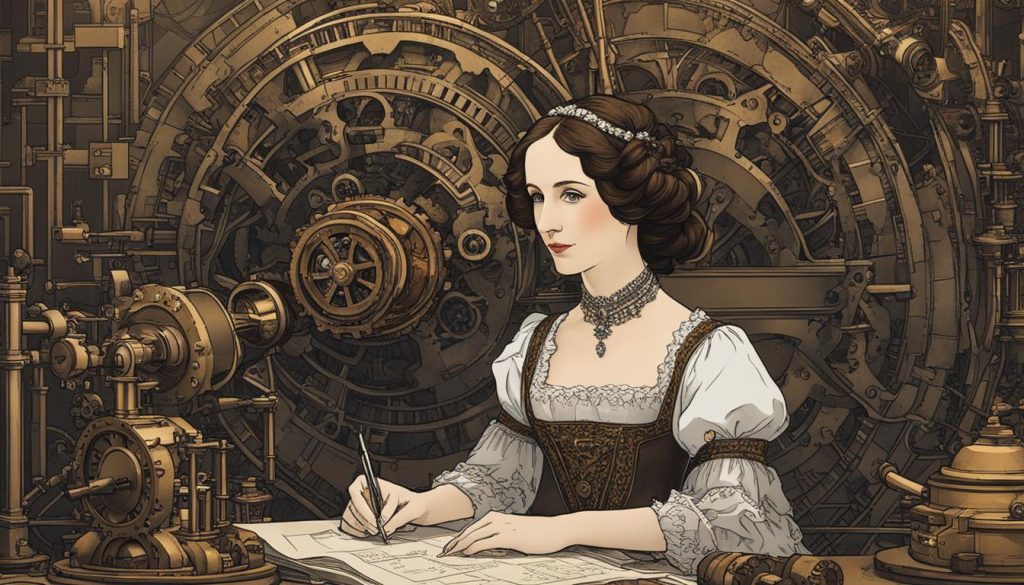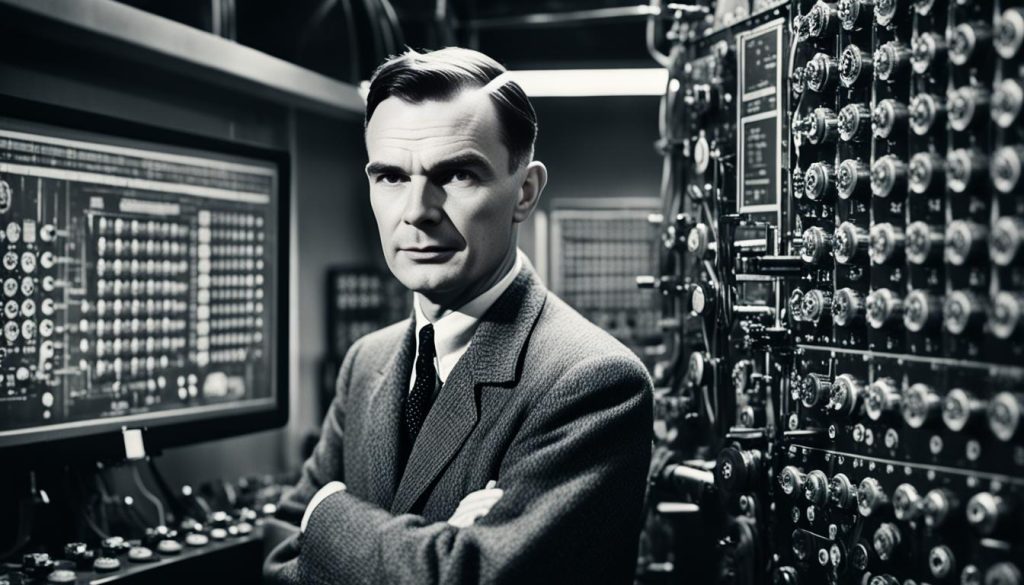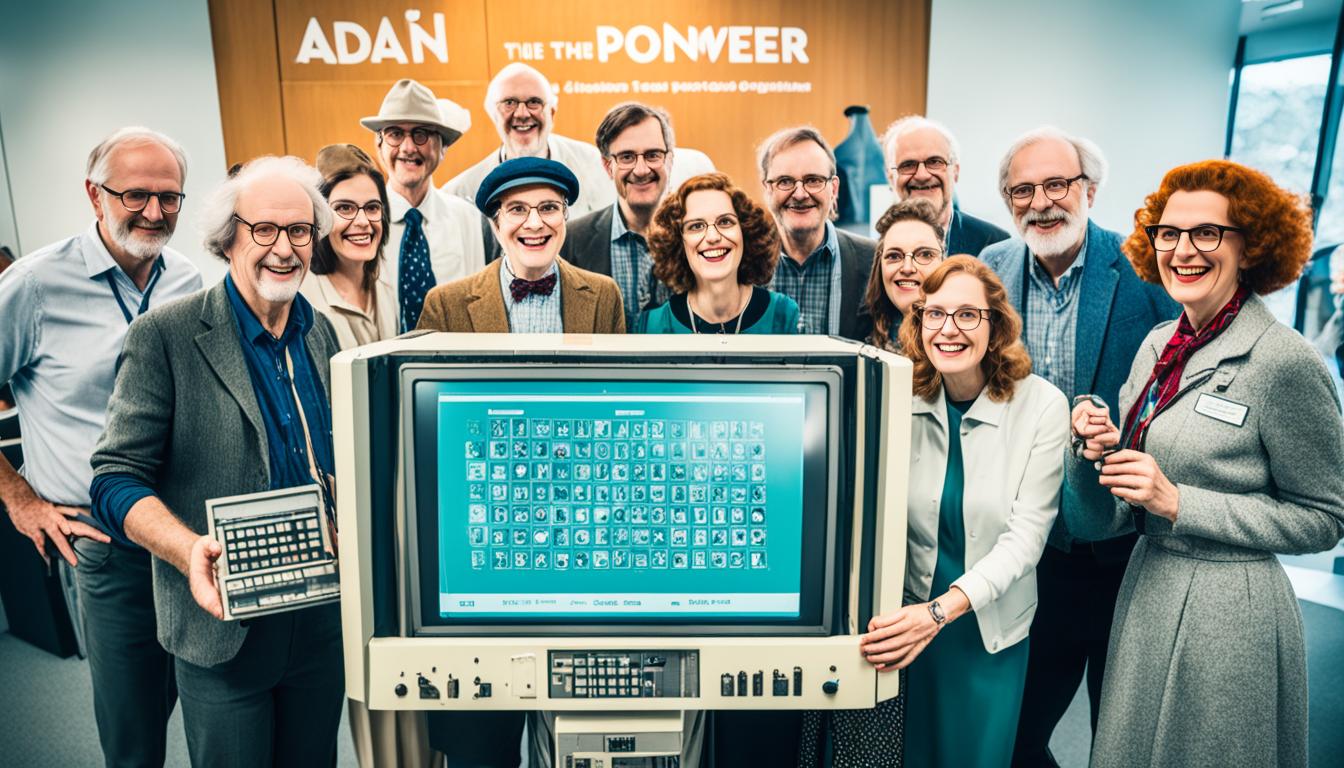As I navigate the vast digital landscape before me, I am in awe of the visionaries who have paved the way for our technological advancements. The pioneers in technology, those who dared to dream and push the boundaries of what was possible, have left an indelible mark on our world. Their innovations have transformed our lives, connecting us in ways we could have never imagined.
When I think of these trailblazers, I am reminded of the incredible contributions made by Ada Lovelace, Alan Turing, and Grace Hopper. Their brilliance and passion have shaped the very foundation of the digital landscape we rely on today. From Lovelace’s pioneering work with the Analytical Engine to Turing’s groundbreaking concepts of computation and Hopper’s trailblazing role in programming languages, these pioneers have set the stage for endless possibilities.
Key Takeaways:
- Ada Lovelace, Alan Turing, and Grace Hopper are visionary pioneers in technology who have revolutionized the field.
- Lovelace’s work on the Analytical Engine laid the foundation for the concept of a general-purpose computer.
- Turing’s conceptualization of the Universal Turing Machine paved the way for modern computer science.
- Hopper’s creation of COBOL and advocacy for standardized programming languages revolutionized software development.
- Recognizing the achievements of these trailblazers is essential for driving progress and innovation in the tech industry.
Ada Lovelace — The Visionary Mathematician
Ada Lovelace, born in 1815, was a mathematician and writer who is hailed as the world’s first computer programmer. She collaborated with Charles Babbage on the Analytical Engine and envisioned a machine that could manipulate symbols and not just numbers. Lovelace’s work on the Analytical Engine included the first known computer program, an algorithm for computing Bernoulli numbers. Her visionary insights into the potential of computing went beyond calculations and laid the foundation for the concept of a general-purpose computer.

“I may remark that the curious transformations many formulae can undergo, the unsuspected and to a beginner apparently impossible identity of forms exceedingly dissimilar at first sight, is I think one of the chief difficulties in the early part of mathematical studies.”
Ada Lovelace’s visionary understanding of mathematics and her ability to envision the potential of machines to manipulate symbols, not just numbers, set her apart as a true trailblazer in the field of technology. Her collaboration with Charles Babbage and her work on the Analytical Engine paved the way for modern computing and established her as the world’s first computer programmer. Through her algorithms and insights, Lovelace demonstrated that computers could be more than just calculating machines, highlighting their potential for general-purpose computing.
The Analytical Engine and Lovelace’s Algorithm
The Analytical Engine, an early design for a mechanical computer created by Charles Babbage, was a marvel of its time. However, Lovelace’s contributions elevated the machine’s capabilities to new heights. She understood that the Analytical Engine had the potential to go beyond performing mathematical calculations and could be programmed to manipulate symbols, which was revolutionary for its era.
In her notes on Babbage’s Analytical Engine, Lovelace wrote an algorithm that could be processed by the machine to compute Bernoulli numbers. This algorithm was not only the first computer program in history but also showcased Lovelace’s visionary mindset. She saw the possibilities for machines to not only calculate but also interpret and produce complex outputs.
“We may say most aptly that the Analytical Engine weaves algebraical patterns just as the Jacquard-loom weaves flowers and leaves.”
The Legacy of Ada Lovelace
Ada Lovelace’s contributions to computing and her vision for the potential of machines laid the foundation for the modern digital landscape we navigate today. Her insights into symbol manipulation and her ability to see beyond traditional calculations were ahead of her time. Lovelace’s work continues to inspire generations of computer scientists and serves as a testament to the power of innovation and imagination.
| Contributions | Impact |
|---|---|
| First computer program | Pioneered the concept of programming and laid the groundwork for the development of modern computer software. |
| Envisioned general-purpose computing | Her insights into symbol manipulation and the potential for machines to perform tasks beyond calculations set the stage for the development of general-purpose computers. |
| Inspiration for future generations | Lovelace’s visionary thinking and contributions continue to inspire and shape the world of technology, particularly in the fields of programming and computer science. |
Alan Turing — Architect of the Turing Machine
Alan Turing, born in 1912, was a pioneering mathematician, logician, and computer scientist. His contributions during World War II played a critical role in the Allies’ victory. Turing’s groundbreaking work involved breaking the German Enigma code, a feat that significantly impacted the outcome of the war.
But Turing’s influence extended far beyond his code-breaking achievements. He is also renowned for conceptualizing the Universal Turing Machine, a theoretical device that laid the foundation for modern computer science. This remarkable invention is capable of simulating the computation of any other machine, making it a groundbreaking concept that revolutionized the field.
“We can only see a short distance ahead, but we can see plenty there that needs to be done.” – Alan Turing
Turing’s visionary ideas paved the way for the development of algorithms and computation, anticipating the core principles that underpin the digital age we live in today. His pioneering work continues to shape the technology landscape and remains a testament to his genius.
The Universal Turing Machine: A Concept that Transformed Computing
The Universal Turing Machine, proposed by Alan Turing, is a milestone in the history of computer science. This theoretical device is capable of simulating the computation of any other machine, making it a powerful concept that transcends the limitations of specific hardware configurations.
With the Universal Turing Machine, Turing demonstrated the possibility of a general-purpose computing machine that could solve a wide range of problems by executing different algorithms. This concept laid the groundwork for the development of modern computers and paved the way for the extensive computational power that we rely on today.
By introducing the Universal Turing Machine, Turing established the idea that a single machine could be capable of simulating the behavior of any other machine, given the appropriate algorithm. This remarkable concept enabled the flexibility and versatility that are fundamental to modern computing systems.
To illustrate the significance of the Universal Turing Machine, let’s take a closer look at its components and principles:
| Components | Principles |
|---|---|
|
|
Through the Universal Turing Machine, Turing introduced the concept of a machine that could simulate the behavior of any other machine, given an appropriate algorithm encoded in the machine’s transition function. This breakthrough laid the foundation for the development of modern computers capable of executing various tasks.
Alan Turing’s contributions to computer science, from breaking the Enigma code to conceptualizing the Universal Turing Machine, have had a profound and lasting impact on the field. His visionary ideas and pioneering work continue to shape the technological landscape, making him one of the most influential figures in the history of computing.

Grace Hopper — Trailblazer in Programming Languages
Grace Hopper, born in 1906, was a pioneering computer scientist and United States Navy rear admiral. She made significant contributions to the development of programming languages, most notably the creation of COBOL (Common Business-Oriented Language). COBOL was designed to be easily understood by humans, allowing for the creation of software by non-specialists. Hopper’s advocacy for standardized programming languages and accessibility in programming laid the groundwork for modern software development practices.
Grace Hopper played a pivotal role in shaping the field of programming languages. With her extensive knowledge and innovation, she revolutionized the way software is created and maintained. Hopper’s creation of COBOL, a language specifically designed for businesses, brought programming to a wider audience and paved the way for the development of other high-level languages.
COBOL, with its English-like syntax, made programming more accessible to non-specialists, enabling businesses to automate their operations effectively. It increased efficiency and productivity by streamlining complex processes, making it easier to develop and maintain large-scale software systems.
“The most dangerous phrase in the language is, ‘We’ve always done it this way.'” – Grace Hopper
Grace Hopper’s commitment to accessibility in programming extended beyond COBOL. She was a vocal advocate for standardized programming languages that could be easily understood and used by a wide range of people. Her efforts paved the way for the development of more user-friendly programming languages, making software development more inclusive and collaborative.
Today, the influence of Grace Hopper’s work can be seen in the continued use of COBOL and the widespread adoption of user-friendly programming languages. Her contributions have had a lasting impact on the field of programming and continue to shape the way we approach software development.
The Legacy of Grace Hopper
Grace Hopper’s contributions to the field of programming languages cannot be overstated. Her pioneering work on COBOL laid the foundation for modern software development practices and accessibility in programming. By creating a language that was easily understandable by humans, Hopper made programming accessible to a wider audience, revolutionizing the way we develop software.
Hopper’s legacy lives on not only in the continued use of COBOL but also in the countless individuals she inspired to pursue careers in computer science. Her trailblazing spirit and dedication to innovation continue to inspire future generations of programmers and technologists.
| Grace Hopper’s Contributions | Impact on Programming Languages |
|---|---|
| Creation of COBOL | Enabled businesses to automate operations and develop software by non-specialists |
| Advocacy for standardized programming languages | Paved the way for more user-friendly languages and increased accessibility |
| Inspiration to future generations | Continues to inspire individuals to pursue careers in computer science |

Pioneers in AI: Shaping the Future of Africa
Africa is at the forefront of technological transformation, making significant strides in the field of artificial intelligence (AI). The continent’s pioneers in AI are addressing the unique challenges and opportunities Africa faces, harnessing the power of AI to drive economic growth and development.
AI-powered healthcare systems are revolutionizing the delivery of medical services in Africa. By leveraging AI algorithms, diagnostic accuracy is improved, enabling personalized treatment plans that cater to individuals’ specific needs. This advancement in healthcare technology has the potential to greatly enhance the overall well-being of African communities.
In agriculture, AI is proving to be a game-changer. Through AI-driven solutions, farmers can optimize crop yields, making agricultural practices more efficient and sustainable. AI also plays a critical role in connecting farmers with markets, enabling them to gain better access to resources, increase profitability, and contribute to the alleviation of food scarcity in the region.
Education is another sector where AI is reshaping Africa’s future. AI-based platforms provide personalized learning experiences, catering to students’ individual needs and learning styles. This technology enables access to quality education and helps bridge the educational gap, ensuring that every child, regardless of their circumstances, has an equal opportunity to thrive.
As the adoption of AI continues to grow in Africa, the continent has the potential to become a global leader in AI innovation. The recognition of AI’s profound impact on the continent’s development is driving both public and private sector investments in AI research and development, creating an ecosystem ripe for innovation and technological advancement.
Incredible Individuals Driving AI Innovation in Africa
Africa is witnessing a remarkable wave of AI innovation, thanks to the vision and determination of individuals who are pushing the boundaries of technological advancement. These AI pioneers in Africa are revolutionizing industries, creating social impact, and shaping the future of the continent.
One such individual is Gys Kappers, the CEO of Dataprophet. With a strong background in machine learning and data science, Kappers is leading his team in the development of groundbreaking AI algorithms. Dataprophet’s innovative solutions are empowering industries in Africa to optimize processes, improve efficiency, and drive growth.
Another visionary driving AI innovation in Africa is Mark Igbinedion, the Founder and CEO of Distinct.ai. Igbinedion’s passion for AI technology has led to the creation of advanced algorithms that are revolutionizing various sectors. Distinct.ai’s AI-powered platforms are making significant contributions to healthcare, education, and finance, enhancing accessibility and transforming lives.
These incredible individuals are not only pioneers in AI innovation but also champions of social impact. Their work is paving the way for sustainable development in Africa, enabling businesses, governments, and communities to thrive in the digital era.
“AI has the power to tackle some of Africa’s most pressing challenges, such as healthcare accessibility, education inequality, and economic inclusion. By harnessing the potential of AI, we can create a brighter future for the continent.” – Gys Kappers, CEO of Dataprophet
“Distinct.ai is committed to leveraging AI for the greater good. Our goal is to empower individuals and organizations with advanced AI solutions that drive positive change and unlock new possibilities.” – Mark Igbinedion, Founder and CEO of Distinct.ai
AI Innovation in Africa: A Catalyst for Growth
The AI innovation led by these visionaries is transforming Africa’s tech landscape and driving economic growth. By harnessing the potential of AI, African countries are leveraging data-driven insights to tackle complex challenges and unlock new opportunities.
| Industry | AI Innovation |
|---|---|
| Healthcare | AI-powered diagnostics, telemedicine, and personalized treatment plans |
| Agriculture | AI-driven precision farming, optimizing crop yields, and connecting farmers with markets |
| Education | AI-enabled personalized learning experiences, bridging the education gap |
The adoption of AI in these key sectors has the potential to revolutionize industries, improve livelihoods, and create a sustainable future for Africa. As AI innovation continues to thrive, Africa is poised to become a global leader in driving meaningful technological transformation.
Women Trailblazers in Tech
Women have emerged as trailblazers in the field of technology, breaking barriers and revolutionizing the tech landscape. Ada Lovelace, Grace Hopper, and Hedy Lamarr are just a few examples of women who have made remarkable contributions to the field.
“The programming community has always benefited from women’s impact, and they have made extraordinary contributions to the development of technology.”
Their achievements have paved the way for women in tech today, such as Sheryl Sandberg, COO of Facebook, and Susan Wojcicki, CEO of YouTube. These influential women have not only excelled in their respective roles but have also become role models for aspiring women in the tech industry.
By promoting diversity and inclusion in the tech industry, we can drive progress and innovation. Gender equality is vital for harnessing the full potential of technology. When women have equal opportunities to thrive in tech, it leads to greater innovation and transformative solutions to real-world challenges.
Fostering Gender Equality in Tech
To foster gender equality in the tech industry, it’s essential to:
- Encourage young girls to pursue STEM education and careers in technology.
- Promote mentorship programs that provide guidance and support for women in tech.
- Advocate for equal pay and equal opportunities for women in tech.
- Establish inclusive workplace policies and foster a culture that embraces diversity.
Creating an environment that values and supports women’s contributions to tech innovation is crucial for driving progress and addressing the challenges of the future. When women have an equal seat at the table, we unlock the full potential of human creativity and ingenuity.
Let us celebrate the women trailblazers in tech and continue to champion gender equality in the field. Together, we can shape a future where women’s voices and talents are fully represented in the world of technology.
Conclusion
The pioneers in technology discussed in this article have left lasting legacies and shaped the digital world we live in today. Ada Lovelace, Alan Turing, and Grace Hopper, among others, have demonstrated their visionary insights, groundbreaking concepts, and commitment to accessibility, paving the way for innovation in the tech industry.
By recognizing the achievements of these trailblazers and advocating for equal representation, we can continue to drive progress and create a more inclusive and dynamic tech landscape for future generations. The legacies of these pioneers in technology remind us of the power of innovation and the potential for a better, more connected future.
As we move forward, it is crucial to celebrate and learn from their contributions. By embracing diversity and fostering an environment that values all voices, we can ensure that the tech industry continues to push boundaries and make a positive impact on our lives. Let us honor and be inspired by these pioneers who have shaped our digital world, and strive to leave our own lasting legacies.


